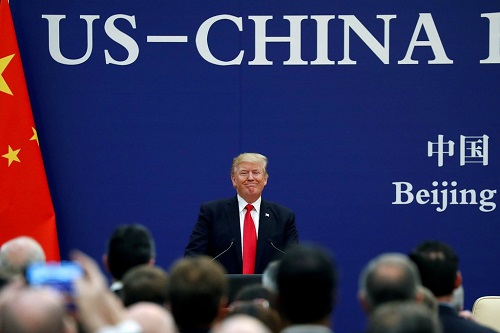flickr photo
By
Tom Arms
America used to be the number one cheerleader for globalisation and free trade. In fact, this has been the case since the end of World War Two.
As a result, countries around the world have adapted their trading policies. Now, the US is the principal cause of anxiety among supporters of free trade.
President Trump’s approach to international commerce is assertive, confrontational, and driven by economic nationalism. It is in danger of undermining the system that has evolved over the last 75 years.
Like most things that have been around for a long time, it is a complex system based on rules managed through the World Trade Organization (WTO) and supplemented with agreements among groups of countries that provide still deeper trade integration.
President Trump has shown little enthusiasm for those deeper agreements. He pulled the US out of one that had yet to be implemented as soon as he took office – the Trans-Pacific Partnership – and has threatened to ditch the North American Free Trade Agreement.
On the WTO, the Trump administration has been ambivalent. The President clearly dislikes it. He would prefer bilateral deals because in such a structure the economic power of the United States would mean it would end up dictating global terms. At the moment he is going through WTO channels in discussing tariffs with China and other countries. But most observers believe that he will opt for the unilateral road in the near future.
This was one of the reasons Rex Tillerson was sacked as Secretary of State. It was the main reason Gary Cohn resigned as Chief Economic Adviser.
At a WTO meeting last week Chinese officials warned that unilateral action by the US undermines the multilateral trading system and sets a very bad precedent. Chinese Ambassador Zhang Xiangchen said that member countries should act together to “lock this beast back into the cage of the WTO rules”.
That won’t be easy. The economic nationalism that motivates President Trump sees other countries as trading unfairly. It sees trade deficits as a sign of weakness, as an indication that trade agreements are defective and unfair.
And Trump is not alone. He has packed his cabinet with echoes of his view. His Commerce Secretary Wilbur Ross, the US Trade Representative Robert Lighthizer (who is in charge of negotiating trade deals) and the president’s trade adviser, Peter Navarro, director of the National Trade Council are all from that mould.
It is true that the United States has some of the lowest tariffs in the world. But does that mean other countries are taking advantage of the US? The mainstream view among trade economists is that the main losers from tariffs are buyers of the affected goods in the country that imposes them. They have to pay more, either because they buy imports from a supplier that has to recover the cost of the tariffs or from a domestic supplier who is able to raise their prices as result of the protection afforded by the tariffs.
The biggest beneficiaries of the tariffs are the producers in the importing countries. The tariffs enable them to compete against cheap imports. Businesses win. Consumers lose.
Trump is focused on the producers/businesses. That may change when he realises more consumers vote than producers.
Tom Arms
I am a journalist, entrepreneur and historian with extensive experience in print, web and broadcast journalism. I started as a diplomatic correspondent, wrote several books (The Falklands Crisis, World Elections On File and the Encyclopedia of the Cold War), and then in 1987 started my own business (Future Events News Service, www.fensinformation.com) which over 25 years established itself as the world and UK media’s diary. Our strapline was: “We set the world’s news agenda.” I sold FENS in December 2012 but retained the exclusive broadcast rights to all of FENS data. To exploit these rights I set up LookAhead TV which produces unique programmes which “Broadcasts Tomorrow Today” so that viewers can “Plan to Participate.” LookAhead has appeared regularly on Vox Africa, Radio Tatras International, The Conversation and Voice of Africa Radio.
In addition to being a syndicated broadcaster and columnist on global affairs, Tom is also available for speaking engagements and can be contacted on Twitter, Linkedin and email: [email protected].



No Comments Yet!
You can be first to comment this post!